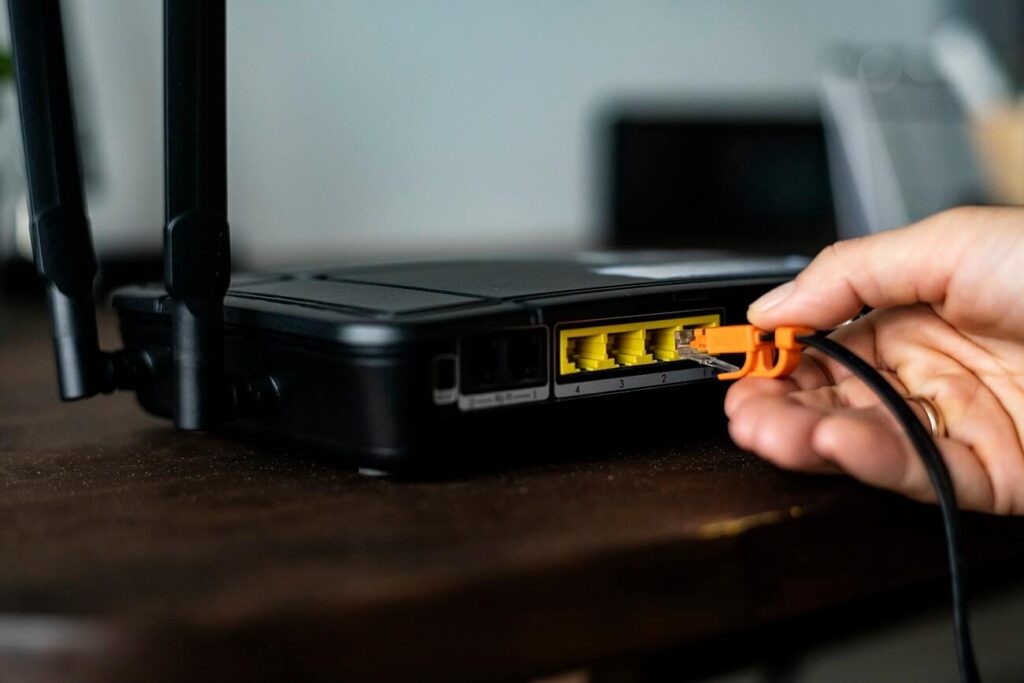If you’re weighing your options from ethernet versus wifi, it’s totally understandable. The differences between the two connections are night and day. On one hand, ethernet could provide you with stable and fast connections. On the other hand, Wi-fi reaches far-flung areas and can accommodate more than one device.
To know which one works better for your needs, continue reading this comparison:
Table of Contents
Ethernet Pros and Cons: Who is it for?

Ethernet cables connect devices to a local network via telephone lines, modem, or router ports to provide an internet connection. Ethernet connection transmits data over cable. It connects to computer networks and serves the bridge from one device to the router, or connects to multiple devices via a local area network (LAN).
advantages of ethernet
- Consistent Speed. Devices connected to Ethernet cables are able to send and receive almost instantly (especially if you’re connected to Fiber internet).
- Stability. As long as the cables are not loose, old, or broken, connecting to an ethernet cable is considerably more stable than Wifi. It also doesn’t prioritize the traffic coming through the cables, so even if your kid is playing games on one computer, and you need to go online for a Zoom meeting, there wouldn’t be an issue.
- Quality of data. The location of your device doesn’t affect speed or connection quality, so your device could be as far or close as possible to the router and it won’t make any difference. In addition, many gamers, web developers, and other heavy computer users prefer ethernet connections because the sound and picture of data are retained.
- Security. Because you can only access the data of a network by physically connecting a device, companies prefer to go with ethernet connections.
The problem with ethernet is that cables often get entangled especially when the connection runs from room to room. Aside from this, using ethernet may not be as popular as Wi-Fi, but it remains a solid choice for individuals and businesses that require stable, secured and fast connections.
Also read: Internet Trends in 2021 You Should Know About.
Wi-Fi Pros and Cons: Who is it for?

If we consider ethernet as a landline… Wi-Fi is the cell phone in this analogy.
Wifi is a wireless connection, which means there are no cables. A tablet, multiple smartphones, a laptop and two desktop computers could all connect to the Wi-Fi.
advantages of wi-fi
- Faster than cellular internet. Wifi is generally slower than wired internet, but it is faster when compared to your phone’s internet.
- Flexibility. Connecting multiple devices on a Wi-Fi network doesn’t result in tangled cables. It is virtually impossible to determine how many devices are currently connected to Wi-Fi, but you can make assumptions on ethernet based on the cables.
- Low cost. Compared to wired connections, wifi is more affordable and is offered by more providers.
- Mobile productivity. In the past, everything had to be wired and connected through a ton of cables. With wifi and other technologies like Bluetooth, you can easily have documents printed without physically transferring documents. You can also work anywhere as long as there is Wifi you can connect to, so accessing work from a cafe, airport, at a beach on the other side of the world, is possible.
The problem with wi-fi is that it suffers signal interference, which is bad both for the security of your data and stability of your connection. It also relies on location, where you are accessing the device from, so the farther you are from the wifi router, the less stable your connection could become.
Contrary to popular belief, Wifi can be as secure as a connection as its wired counterpart. You just need to do extra measures to keep your connection secured. However, public wifi connections, the ones you access in airports and other similar areas, can pose extreme security risks if you’re not careful.
Wireless coverage areas have a limited range of connectivity (often from 50-300 ft
Ethernet versus Wi-fi: Which one is better?

The answer to this question depends on your personal requirements
Go with an ethernet connection if:
- You love to play online games
- You upload and download large files
- You work with bandwidth-hungry applications, such as Adobe
- You stream videos on YouTube, Netflix, and other sites regularly
- You cannot move your workstation/desk freely near your modem (of course you can use as much ethernet cables you want, but this also means your data would travel “longer”)
Go with a Wifi connection if:
- There is no ethernet-based internet provider in your area
- Multiple devices will connect to the internet simultaneously
- Your coverage area is below 300 feet (most wifi connections can’t reach over 300 feet away from the router)
Ultimately, cost, convenience, and considerations related to your operation or connectivity requirements will ultimately determine which option to choose.


























